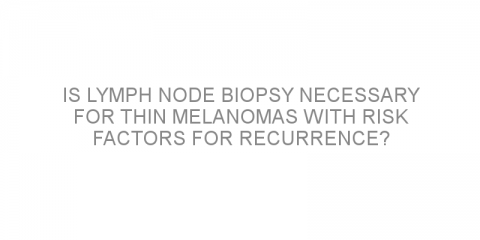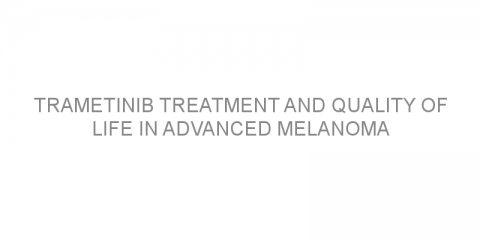In a nutshell The authors aimed to determine the effect of sun exposure on cutaneous melanoma development. Some background Cutaneous melanoma is the most common form of melanoma and can occur on all areas of the skin. One of the main factors involved in melanoma development is sun exposure. Solar elastosis, also known as actinic elastosis, is a...
Read MoreLocation-Skin melanoma Posts on Medivizor
Immunotherapy after chemotherapy shows promising results in advanced melanoma
In a nutshell The authors aimed to determine survival and response rates of patients treated with immunotherapy following regional chemotherapy. Some background Regional chemotherapy is chemotherapy that targets a specific area in the body. It is carried out using isolated limb infusion (isolates blood flow to the limb to allow for a more...
Read MoreA new therapy for advanced malignant melanoma?
In a nutshell The authors aimed to determine the effects of GC1008 (Fresolimumab) as a treatment option in advanced malignant melanoma. Some background Transforming growth factor beta (TGFβ) is a protein in the body that helps to maintain cell growth and the immune system. In advanced cancer TGFβ can lose this function and can instead...
Read MoreAre vitamin D or smoking associated with melanoma survival?
In a nutshell The authors aimed to determine whether factors such as vitamin D levels and smoking can affect inflammation and overall melanoma survival. Some background Inflammation is the body's method of self-protection in response to harmful stimulants like damaged, cancerous cells in melanoma. In some cases inflammation can become...
Read MoreIs lymph node biopsy necessary for thin melanomas with risk factors for recurrence?
In a nutshell This study examined whether lymph node biopsy is beneficial for determining prognosis in patients with thin melanomas and at least one risk factor for recurrence. Some background Staging for melanoma (a determination of how advanced the disease is in a particular patient) includes measures of multiple factors, such as Breslow...
Read MoreOlder age is associated with a lower rate of lymph node metastasis
In a nutshell The authors evaluated the association between age and sentinel lymph node metastasis in melanoma. Some background It has previously been reported that patient age is a highly significant and independent predictor of survival outcome in melanoma. For patients with localized melanoma (stage I and II melanoma; the tumor has not spread),...
Read MoreHow does the presence of residual cancer cells after excision affect recurrence and survival?
In a nutshell The authors evaluated the effect of residual melanoma after excision of the primary tumor on prognosis in cutaneous melanoma. Some background Cutaneous melanoma is the most malignant form of skin cancer, which accounts for 90% of all deaths caused by skin cancer. When a cutaneous melanoma is suspected, an excisional biopsy (removal...
Read MoreThe impact of a negative sentinel lymph node biopsy on recurrence and survival after recurrence in melanoma
In a nutshell The authors reviewed the patterns of recurrence and survival after negative sentinel lymph node biopsy for melanoma. Some background The increasing incidence and prevalence of melanoma are in stark contrast to the overall decrease in the incidence rates of other cancers such as lung, prostate, breast, and colorectal cancer. Despite...
Read MoreLymphadenectomy timing and disease prognosis
In a nutshell This study evaluated the timing of lymphadenectomy and its impact on the outcome of melanoma patients with lymph node metastasis. Some background Among melanoma patients, spread of the cancer to the regional lymph nodes (referred to as lymph node involvement or lymph node metastasis) is known to significantly increase the risk...
Read MoreTargeted melanoma therapy; patterns of progression and response
In a nutshell This study examined the patterns of disease response and progression among patients with metastatic melanoma treated with a combination of MAPK inhibitors. Some background BRAF is an important gene regulating cell division and growth through a process mediated by an enzyme known as mitogen-activated protein kinase or MAPK....
Read MoreSelumetinib; a new MEK inhibitor tested
In a nutshell This phase II trial evaluated the efficacy and safety of selumetinib in combination with docetaxel (Taxotere) as first-line treatment for patients diagnosed with advanced melanoma. Some background Despite recent advances in targeted biological agents for the treatment of BRAF-mutated melanoma, treatment options for wild-type BRAF...
Read MoreTrametinib treatment and quality of life in advanced melanoma
In a nutshell This study compared quality of life among advanced melanoma patients receiving either trametinib (Mekinist) or chemotherapy. Some background Until recently, chemotherapy was the treatment of choice in the treatment of wide spread melanoma. Since the identification of commonly occurring genetic mutations in melanoma tumors, several...
Read More










